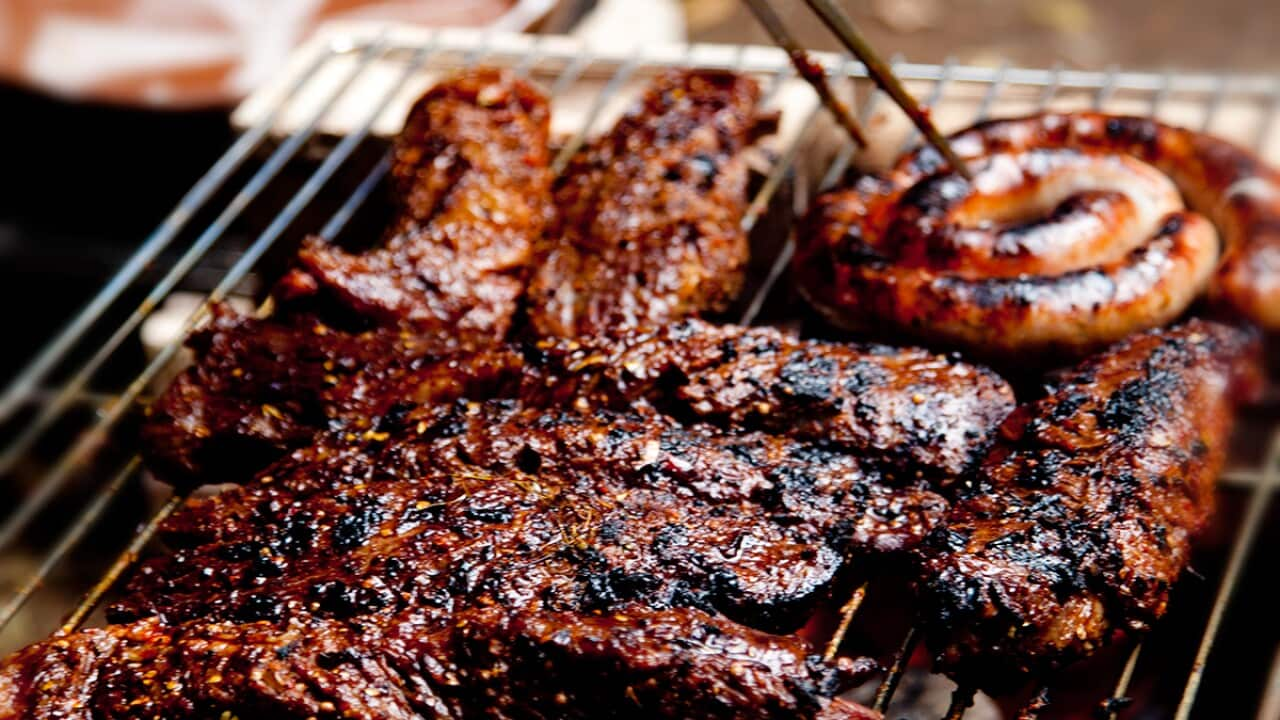--- Learn all the key regional dishes across Africa with Africa on a Plate, weekdays at 2pm on SBS Food or stream it on . ---
Who would be better than homegrown chefs to take people on a culinary journey across Africa? That was the rhetorical question that inspired Lentswe Bhengu to make the TV series .
"We're unapologetically focused on black businesses," the producer and co-host tells SBS Food. "The reason I started Africa on a Plate is because I wanted African chefs talking about African cuisine in Africa. There wasn't content like that anywhere back then. We were listening to Jamie Oliver and Gordon Ramsay and all these guys coming here and talking about our food."
The series starts in Bhengu's home country, South Africa, then moves through Tanzania, Nigeria, Morocco, before it returns south to Lesotho. Here are a few things you should know before getting stuck in.
1. There isn't one single African cuisine
Bhengu with fellow chef and co-host Zama Memela showcase the many faces of African cuisine. Being the second-largest continent by geographical area and population after Asia, Africa encompasses many cuisines.
In North Africa, you can find , , , and . West Africa is home to , , and . Central Africa is where you can eat , , and many and -based dishes.
Central Africa is where you can eat , , and many and -based dishes.

You can find tagine in North Africa. Source: SBS Food
In East Africa, you'll find various flatbread, , grilled seafood, and mashed , while in South Africa, you can eat , and barbecued meat at a .
HOW TO BARBECUE IN SOUTH AFRICA

DJ sets and meat sweats: Barbecuing in South Africa
3. It's all about what's grown locally
Bhengu says, "The different African cuisines are directly related to the produce grown specifically in those regions. If you go to Central, East and West Africa, they use lots of cassava, they have certain types of ingredients that only grow in that area.
"All the way towards the north, in Morocco, you have sweeter fruits, it's more Mediterranean-like."
The bases of many dishes often comprise of rice and other grains like and , bread, legumes or starchy vegetables and fruit like cassava, yam and plantain.

Millet forms the base of many dishes in Africa.
2. You'll also find foreign influences
African countries are influenced by each other and places further abroad. The Egyptian koshari and South African bunny chow have Indian origins. On the Swahili Coast, ingredients like pomegranate juice remind us of Middle Eastern flavours. Central Africa's makayabu is a local version of Portugal's .
I wanted African chefs talking about African cuisine in Africa.
South Africa's cuisine is especially diverse and is often referred to as "rainbow cuisine". "We have so many other nationalities calling South Africa home; Dutch, Indian, English, French and other African countries. We're a big melting pot of other communities within one," says Bhengu.
In the South African episodes of Africa on a Plate, Bhengu visits the country's first black-owned winery, researches how to make the perfect curry, prepares his version of a traditional Zulu tripe dish and explores many other facets of his country's cuisine.
KOSHARI: INFLUENCED BY INDIAN FOOD

Lentils and rice with tomato (koshari)
4. Spices and condiments are a must
Because loads of spices grow in Africa, they are the cornerstone of many dishes.
Cinnamon, ginger and cumin are especially popular throughout the continent, as are spice blends like , , and . Spice-filled hot or sour condiments such as , and also give some punch.
Benghu travelled to Zanzibar to find out more about the spices there. "The spice trade is huge there, it's the spice mecca of Africa so I had to visit a couple of spice farms," he says.

Spice, herb and nut blend dukkah is the perfect accompaniment to many dishes like these lamb cutlets. Source: Falafel for Breakfast
5. African cuisine deserves its place in the sun
Many Australians consider themselves worldly eaters, but African cuisine hasn't entered the mainstream here in the same way that Asian and European cuisines have.
Chef Duncan Welgemoed of Adelaide restaurant Africola SBS Food in November, "I don't like talking 'bout trends because they generally fizzle out. But I do think the potential for more households to draw the influences of African food into their own repertoire is immense. More people will start eating African food, because it's vegetable and grain-heavy and packed with flavour."
More people will start eating African food, because it's vegetable and grain-heavy and packed with flavour.
If you need a point to start your African home cooking adventures, tune it to , where Bhengu and Memela will take you from street stalls to high-end restaurants across the continent.
"I wanted to unearth those stories and put them on this big platform. African cuisine is not given a platform like Asia and Western continents," Bhengu says.
FOOD OUT OF AFRICA

How a business course helped take an East African chilli sauce to market









